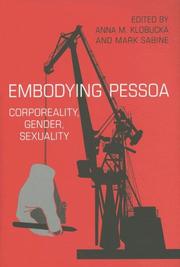| Listing 1 - 4 of 4 |
Sort by
|

ISBN: 144262776X 9781442627765 9780802091987 0802091989 1442658622 Year: 2007 Publisher: Toronto, [Ontario] ; Buffalo, [New York] ; London, [England] : University of Toronto Press,
Abstract | Keywords | Export | Availability | Bookmark
 Loading...
Loading...Choose an application
- Reference Manager
- EndNote
- RefWorks (Direct export to RefWorks)
he multifaceted and labyrinthine oeuvre of the Portuguese poet Fernando Pessoa (1888-1935) is distinguished by having been written and published under more than seventy different names. These were not mere pseudonyms, but what Pessoa termed 'heteronyms,' fully realized identities possessed not only of wildly divergent writing styles and opinions, but also of detailed biographies. In many cases, their independent existences extended to their publication of letters and critical readings of each other's works (and those of Pessoa 'himself').Long acclaimed in continental Europe and Latin America as a towering presence in literary modernism, Pessoa has more recently begun to receive the attention of an English-speaking public. Embodying Pessoa responds to this new growth of interest. The collection's twelve essays, preceded by a general introduction and grouped into four themed sections, apply a range of current interpretative models both to the more familiar canon of Pessoa's output, and to less familiar texts - in many cases only recently published. As a whole, this work diverges from traditional Pessoa criticism by testifying to the importance of corporeal physicality in his heteronymous experiment and to the prominence of representations of (gendered) sexuality in his work.
Heteronyms. --- Gender identity in literature. --- Lexicology --- Semantics --- Pessoa, Fernando, --- Pessoa, Fernando --- Caeiro, Alberto --- Reis, Ricardo --- de Campos, Alvaro --- de Teive, --- van Teive, --- Soares, Bernardo --- Search, Alexander --- Criticism and interpretation.

ISBN: 9781442627765 9780802091987 Year: 2016 Publisher: Toronto, Ont. University of Toronto Press
Abstract | Keywords | Export | Availability | Bookmark
 Loading...
Loading...Choose an application
- Reference Manager
- EndNote
- RefWorks (Direct export to RefWorks)
Book
ISBN: 9780981458038 Year: 2015 Publisher: Place of publication unknown Fundação Luso-Americana
Abstract | Keywords | Export | Availability | Bookmark
 Loading...
Loading...Choose an application
- Reference Manager
- EndNote
- RefWorks (Direct export to RefWorks)
Book
Year: 2001 Publisher: Dartmouth, Massachusetts : Tagus Press, Center for Portuguese Studies and Culture, University of Massachusetts Dartmouth,
Abstract | Keywords | Export | Availability | Bookmark
 Loading...
Loading...Choose an application
- Reference Manager
- EndNote
- RefWorks (Direct export to RefWorks)
"For many decades, José Saramago has been a staunch defender of the role of literature to both serve and be perceived as public discourse. When, in October 1998, he became the first Portuguese-language author to be awarded the Nobel Prize for Literature, his conviction was supported by the assurance that, at any rate, this particular writer’s literary discourse was guaranteed to be widely (and globally) publicized. If, as Wlad Godzich has claimed, the severely limited possibility of public discourse in the contemporary world is compensated by the ever-multiplying variety of ways to publicize discourses (“Workshop”), Saramago has taken full advantage of the opportunities offered in this respect by the Nobel prize as probably the most effective institutionalized instrument of publicity that high literary discourse which is produced worldwide has at its annual disposal. His international visibility greatly amplified, Saramago could be seen in the last two years shuttling the globe and making globally publicized statements on behalf of the many political causes that have attracted his attention and support." -- Publisher's description.
| Listing 1 - 4 of 4 |
Sort by
|

 Search
Search Feedback
Feedback About UniCat
About UniCat  Help
Help News
News